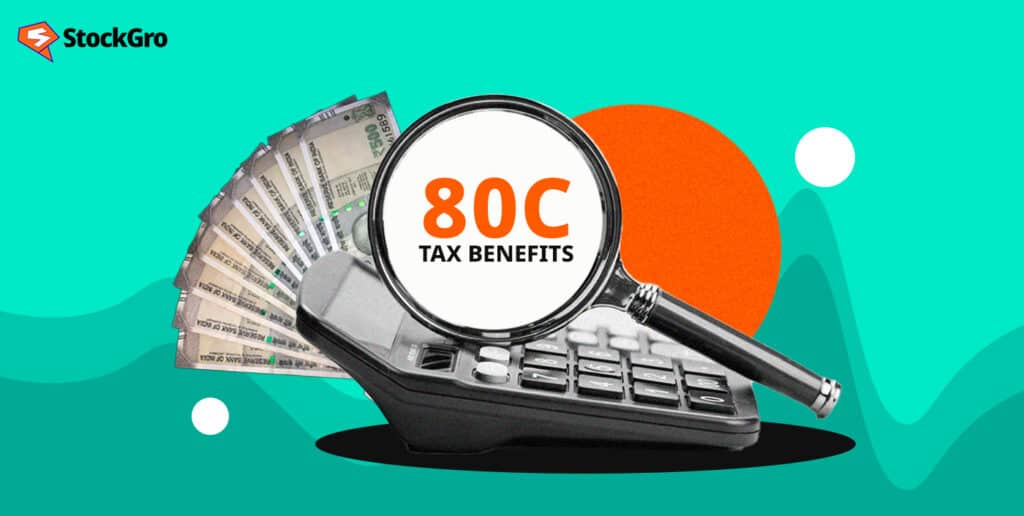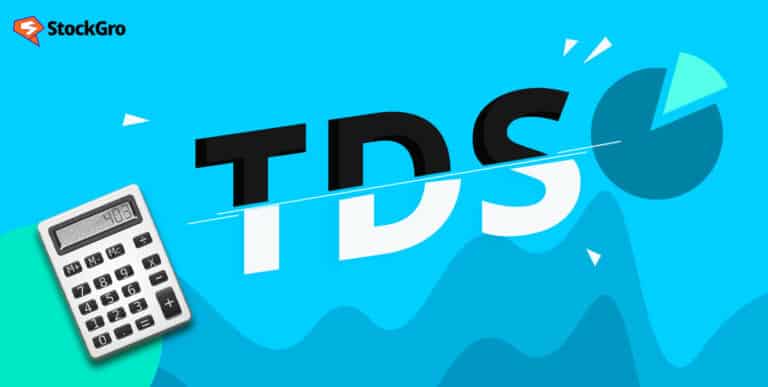
For a taxpayer, tax deduction helps reduce the overall tax burden. The increasing percentage to pay tax after an income limit affects the overall savings of a working professional.
To bring down the burden, the Income Tax Department provides different deductions that can encourage saving and investments among taxpayers, and 80C is one of these deductions that helps with tax liability.
If you are wondering what 80C is in income tax and its sub-sections, Here is a guide that presents you with the complete details.
What is 80C in income tax?
Under section 80C in the income tax act 1961, a taxpayer can get a deduction of up to Rs 1.5 lakh per financial year. However, the 80C deduction is not available in partnerships, companies, and corporate bodies but to individual taxpayers and Hindu Undivided Families.
Section 80C has sub-sections 80CCC & 80CCD. You could deduct the amount from your total taxable income for the Previous Year (PY) if you used some of your income for these purposes during the PY.
For example, if your gross total income for FY 2022-23 is Rs 10,00,000. You will get a deduction of Rs 1,50,000/- if you have an investment in LIC, Mutual Funds, or any other area included in 80C.
You may also like: What is TDS? A complete overview of TDS in income tax
What is the eligibility for investment and deduction in 80C?
To fall under the eligibility criteria of section 80C, you need to present certain investments done in the respective financial year. Some of these are-
1. Life Insurance Premium
Premiums for life insurance, either for you or your family, help in tax deduction under section 80C. However, if it is a single premium policy, the insurance coverage cannot be cancelled within two years after its start date.
In case of multiple premiums, you must pay the premiums for the next two years. The Section 80C deduction will be reversed if this is not done. ULIPs are unit-linked life insurance policies that are also deductible under Section 80C.
Tax on Returns: According to Section 10(10)(D) of the Income Tax Act, the returns on life insurance policies with insurance covers that are at least ten times the annual premium are tax-free.
2. Investment in ELSS mutual funds:
ELSS mutual funds invest 80% of their corpus in stocks and have a 3-year lock-in period.
Tax on return: Long-term capital gains tax charged at a rate of 10% on ELSS profits over Rs. 1 lakh.
3. Public Provident Fund (PPF):
This government savings program has an interest rate that the government manages. Most banks and post offices provide investment opportunities in it. It has a fifteen-year term.
Tax on Returns: There is no tax due on PPF returns. However, you are required to include PPF results in your yearly income tax return.
4. Employees’ Provident Fund (EPF):
Section 80C allows employees to deduct their contributions from their EPF account. While employer contributions are likewise tax-free, they are not deductible under Section 80C.
Tax on Returns: The interest rate on EPF accounts is tax-free. When you terminate your employment with an EPF-registered firm, nevertheless, it becomes taxable. If EPF is withdrawn before 5 years, the interest also becomes taxable.
5. National Pension System (NPS):
Sections 80CCD (1) and (2) permit the deduction for NPS. Under Section 80C, both employer and employee contributions to the NPS fall under deduction. To receive the advantage of this part, your employer’s payments must not exceed 10% of your basic wage plus your dearness allowance.
The benefit is also available to self-employed individuals who contribute up to 20% of their gross income.
Additionally, under Section 80 C, voluntary donations to the NPS up to Rs. 50,000 are exempt above and above Rs. 1.5 lakh. Under Section 80CCD (1B), these voluntary contributions are tax deductible.
Tax on Returns: Until maturity, NPS returns are tax-exempt. 40% of the total corpus is tax-free when it matures.
Also Read: Understanding GST: The tax superhero of India
6. Sukanya Samriddhi Yojana:
This is a government-sponsored program that encourages female students to save money. Parents can open an account for their daughters younger than ten years old. The program lasts 21 years or until the girl child marries after turning 18.
Returns Tax: Sukanya Samriddhi Scheme returns are tax-free.
7. Tax Saving FD
Fixed deposit products, known as Tax Saving FDs, are available from both banks and post offices and qualify for Section 80C tax deductions. These FDs give a maximum tax exemption of Rs. 1.5 lakh and a 5-year lock-in period. However, these instruments’ returns are subject to taxation.
8. Principal Repayment towards Home Loan
Besides the above 80C deduction list, other investment options fall under the deduction range-
Individuals can claim an exemption for the construction of the property. Similarly, an individual can get an exemption for the property transfer within 5 years of the possession.
If a transfer is made after five years since the property’s owner took possession of it, any tax deductions claimed should be subject to tax in the transfer year. It will also be excluded from the requirements of Section 80 C if this paragraph is not met.
- Tuition fees for up to two children.
- Home loan repayment
- Stamp duty/fee for the transfer of house property to yourself
- Investment in a tax-saver 5-year fixed deposit.
What are sub-sections of 80C and tax saving investment options?
80C deduction under the Income Tax Act, 1961 has different sub-sections allowing you to be eligible for tax deductions. These are-
| Sections | Eligibility for Tax Deductions |
| 80C | Payment made towards pension plans and mutual funds. |
| 80CCC | Contributions made towards government-sponsored plans such as the National Pension System, the Atal Pension Yojana, and others. |
| 80CCD (1) | Investment towards government-sponsored plans such as the National Pension System, the Atal Pension Yojana, and others. |
| 80CCD (1B) | Investments of up to Rs.50,000 in NPS. |
| 80CCD (2) | Contribution by the employer towards NPS (up to 10%, comprising basic salary and dearness allowance) |
Also Read: Gold vs Equities- Which is the right investment option?
Takeaway
To get the best benefit of deduction under Section 80C, you must connect with the right IT expert who can help you get the deduction and tax benefits. Doing good research about tax deductions under 80c will help you save enough money yearly.

